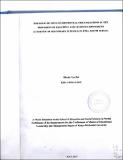| dc.description.abstract | ABSTRACT
Availability of learning and teaching resources, their relevance and adequacy contribute to academic achievement. In South Sudan the increase of school enrolment rates following the declaration of independence and the subsequent return of refugees, especially in the capital Juba, have placed undue strain in teaching and learning resources. Though, both local and international non-governmental organizations have been instrumental in supporting the education sector, their role in the provision of teaching and learning resources in schools in the area is not well understood. Therefore, the purpose of this study was to find out the role played by NGOs in the provision of teaching and learning resources in secondary schools in Juba, South Sudan. Thus, the study sought to determine how NGOs provide; training opportunities for teachers; teaching and learning resources; infrastructural aid and training opportunities for school managers to facilitate teaching and learning in secondary schools in Juba, South Sudan. Descriptive survey research design was used targeting 21 secondary school heads, 92 heads of local NGOs and 130 local heads of international NGOs in Juba County. A sample of 151 respondents was selected randomly from the target population. Data collection was done using pilot tested questionnaires. Tests for validity and reliability ascertained the credibility of instruments for the study with the latter yielding an acceptable reliability coefficient of r = 0.8106. Descriptive statistics involving means, modes and standard deviations, and inferential statistical methods involving Pearson's Product Moment correlation and multiple regression analysis, were used to analyse the data which were presented in tables. The findings revealed that, first, with regard to the first objective, most of the NGOs in the area played an active role in the provision of training opportunities for teachers to facilitate teaching and learning in secondary schools in the area. Second, it was evident that most of the NGOs were not very active in the provision of teaching and learning resources, especially, text books in secondary schools in the area. Third, it was evident that most of the NGOs were involved in the provision of building materials for schools in the area. Fourthly, it was established that most of the NGOs operating in the area facilitated training for school heads in leadership and management of teaching and learning resources. Therefore, it was concluded that the role played by NGOs in the provision of teaching and learning resources in secondary schools in Juba County was indeed significant in all aspects and led to effective teaching and learning in schools in the area. It was recommended that the NGOs should redouble their efforts in the provision of teacher training and placement as it emerged that most teachers were not well trained and expressed difficulty in handling certain subjects. They also need to work closely with the government of South Sudan and other stakeholders to develop universal curriculum so as to enable them to strengthen their interventions in terms of availing instructional material to the schools. It was recommehded that the NGOs seek alternative ways of improving school infrastructural aid such as more community involvement that could lead to savings in labour, material and costs. Finally, it is important that in addition to training the school heads in the management of the schools, the NGOs demand audit reports of the teaching and learning material and also carry out regular inspections to ascertain their efficacy in effective teaching and learning in the schools. | en_US |

